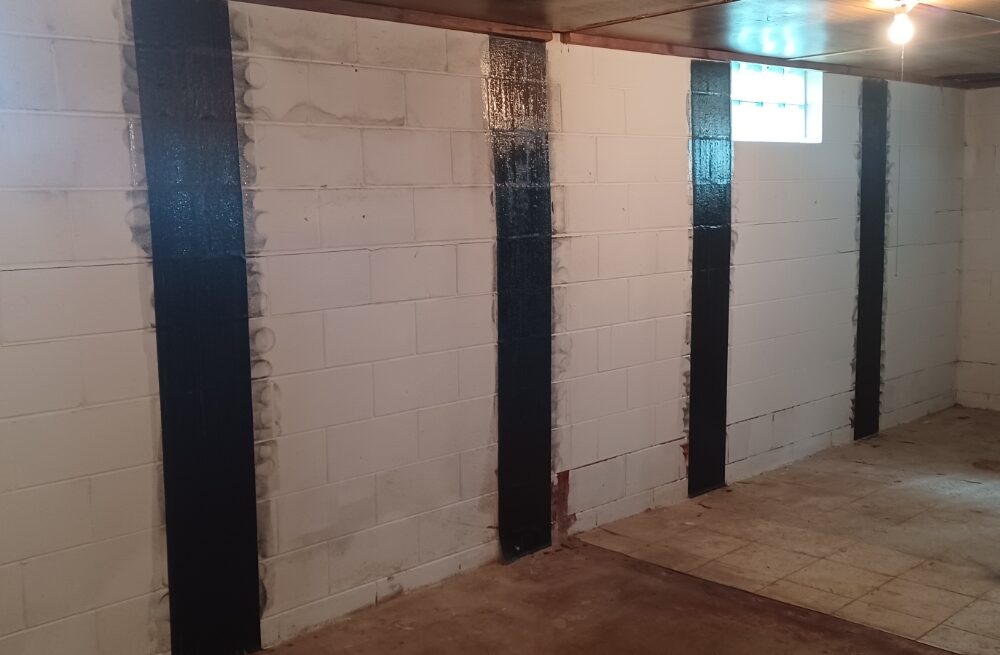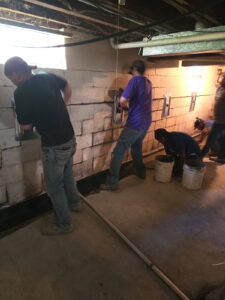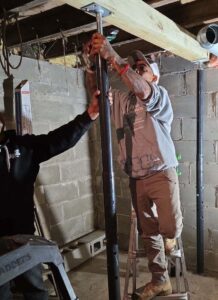
You’ve noticed a few hairline cracks in your home’s foundation, but you’re not taking them seriously. Yet, what if you’re overlooking a ticking time bomb? These subtle signs often lead to costly structural damage that not only eats away at your home’s integrity but also your pocketbook as well. Foundation problems can also significantly impact your home’s market value, potentially deterring potential buyers. So, isn’t it worth understanding the true cost of ignoring these issues? Stick around, you’ll be surprised at the information to come.
Key Takeaways
- Ignoring foundation problems can lead to major structural damage, escalating repair costs significantly.
- Foundation issues can drastically reduce a home’s value, deterring potential buyers and lowering resale value.
- Unaddressed foundation problems can pose health risks, including mold growth that leads to respiratory issues and the spread of diseases by pests.
- Emotional stress from ongoing foundation concerns can severely impact mental health and overall well-being.
- Proactive measures like regular inspections and timely repairs can prevent major expenses, preserving home value and ensuring safety.
Understanding Home Foundation Basics
 Although it’s often overlooked, your home’s foundation is crucial to its overall health and longevity. It’s the bedrock upon which your house stands, providing stability, strength, and protection against the elements. Understanding the basics of different foundation types and the importance of soil stability can save you a lot of worry and money down the line.
Although it’s often overlooked, your home’s foundation is crucial to its overall health and longevity. It’s the bedrock upon which your house stands, providing stability, strength, and protection against the elements. Understanding the basics of different foundation types and the importance of soil stability can save you a lot of worry and money down the line.
There are three main types of foundations: slab, crawl space, and basement. Slab foundations are exactly what they sound like, a concrete slab that your house is built upon. They’re cost-effective and great for areas with high soil stability.
Crawl space foundations are raised off the ground, providing room for utilities and ventilation. They’re suitable for damp or termite-prone areas.
Basement foundations, while more expensive, offer additional living or storage space.
The type of soil your home is built on can greatly affect your foundation. Certain soils, like clay, can expand and contract, causing foundation issues. Ensuring soil stability is key to a strong, long-lasting foundation.
Common Signs of Foundation Problems
Recognizing common signs of foundation problems can save you from massive repair bills in the future.
It’s all about being proactive and not letting small issues turn into big ones. So, what should you look out for? Let’s delve in.
The first telltale sign is cracking.
But not just any crack, the type of crack can indicate different problems. Vertical cracks might suggest soil settlement or shrinkage, whereas horizontal cracks could be a sign of pressure build-up. Then there’s diagonal cracking, which often indicates differential settling.
Furthermore, if you’re noticing cracks in your tiles or plaster, that’s another sign your foundation might be in trouble.
Another common sign is uneven or sloping floors.
This might mean the soil beneath your home is settling unevenly, putting stress on your foundation. Similarly, doors and windows that stick or won’t close properly can also be symptoms of a faulty foundation.
Lastly, pay attention to your home’s exterior.
Are there gaps between the windows or doors and the bricks? Are there cracks in your bricks or concrete blocks? If so, these could be signs of foundation issues.
Don’t ignore these signs. Your home’s foundation is way too important.
Hidden Dangers of Foundation Cracks
Beneath those unassuming cracks in your foundation lurk hidden dangers that can seriously compromise the safety of your home. You may think that it’s just an aesthetic issue. But, that’s not the case.
There are different crack types, and each can indicate a specific problem. Hairline cracks may seem harmless, but they can turn into a more serious issue if ignored. They might signal the start of structural damage.
Horizontal cracks are even more alarming. They’re often a sign of external pressure, which can lead to your walls bowing or even collapsing.
Then, there’s the issue of water. Cracks can allow water to seep into your basement, leading to mold and mildew. This not only damages your home, but it’s also a health hazard.
Now, let’s talk about repair methods. Sealing the crack is a common method, but it’s often a temporary fix. To fully address the issue, you may need to reinforce your foundation, which can be costly.
The Impact on Your Home’s Value
You may not realize it, but foundation problems can drastically decrease your home’s real estate value.
Often, potential buyers are deterred by these issues, as they foresee costly repairs in the future.
It’s crucial to understand the impact this can have on your investment and ways to mitigate it.
Decreased Real Estate Value
A significant drop in your home’s value can be a disastrous consequence of foundation problems.
You’ve invested so much time, money, and energy into making it a place to call your own. Now, imagine the pain of seeing its worth plummet due to overlooked foundation issues.
Market trends dictate that a structurally sound home is a hot commodity. Buyers are more inclined to invest in properties they believe to be reliable. If your home’s foundation is compromised, it’s not just the aesthetics that take a hit; it’s the overall integrity of the property.
The resale value you’re likely to get is a mere fraction of what you’d hoped for.
Foundation problems don’t just affect the here and now. They’re a ticking time bomb that wreaks havoc on your home’s future worth. You mightn’t feel the sting immediately, but when it’s time to sell, you’re bound to feel the burn.
Don’t let the market trends leave you in the dust. Address those foundation issues now and safeguard your home’s value.
It’s not just about maintaining your home, it’s about preserving your investment.
Potential Buyers’ Deterrent
Nearly all potential home buyers will think twice before investing in a property with foundation issues. This buyer hesitation isn’t just about fear of the unknown; it’s also about the financial implications. After all, a faulty foundation can lead to expensive repairs, not to mention potential safety risks.
Remember, buying a home is a significant investment, and people want to ensure they’re making a wise decision. When you’ve got visible cracks, uneven floors, or moisture issues, you’re sending a clear signal that the home might be more trouble than it’s worth. Consequently, buyers may either walk away or significantly lower their offer, both of which can hit your wallet hard.
Don’t kid yourself into thinking you can hide these problems either. Most savvy buyers will bring in an inspector who can easily spot these issues. If they discover you’ve been less than truthful, you can expect negotiations to be difficult, if not downright impossible.
Ignoring foundation problems won’t make them disappear. Instead, it lowers your home’s value and deters potential buyers.
Costs Associated With Foundation Repairs
You’re probably wondering about the costs associated with foundation repairs.
Unforeseen repair expenses can take a toll on your budget, and the overall impact on your property’s value is another aspect to consider.
We’ll now take a closer look at these financial implications.
Unforeseen Repair Expenses
Unexpected financial burdens often come hand-in-hand with foundation repairs. When you’re dealing with a damaged foundation, you’re not just facing the initial repair costs.
There’s a whole host of unforeseen expenses that can quickly eat into your repair budgeting, leaving you with a bigger problem than you anticipated.
- Emergency Fixes: When foundation problems are left unattended, they often lead to urgent emergency fixes.
These unexpected repairs can cost a fortune, draining your pocketbook faster than you can fill it.
- Structural Integrity: Ignoring foundation problems will gradually compromise your home’s structural integrity.
This can escalate into a full-blown renovation project requiring even more funds.
- Long Term Consequences: The longer you ignore the problem, the more severe the long term consequences can be, leading to higher costs in the future.
- Additional Repairs: Cracks and shifts in your foundation can lead to other issues, such as plumbing or electrical problems, which will also need to be addressed.
Impact on Property Value
Without a doubt, the impact on your property’s value can be significant when dealing with foundation repairs. Foundation aesthetics and structural integrity are critical factors that potential buyers evaluate when considering a property. Unaddressed foundation issues can easily turn off buyers, causing your property’s value to plummet.
The thing is, buyers aren’t just looking for a pretty house. They’re looking for a home that’s solid from the ground up. If they spot cracks or other signs of foundation problems, they’ll likely think twice before making an offer.
And if they do make an offer, it’ll probably be much lower than you’re hoping for.
But it’s not just about the resale value. The structural integrity of your foundation is crucial for your home’s overall safety and longevity. Ignoring minor issues today can lead to major repairs down the line, costing you thousands of dollars.
Insurance Coverage for Foundation Damage
Navigating the world of insurance policies can be a daunting task. You may find yourself overwhelmed when trying to understand the coverage limits, claim process, and policy exclusions related to foundation damage.
It’s important to remember that not all damage assessment costs or repair types are covered by standard policies. You’ll need to review your policy carefully and consider additional policy riders to ensure you’re adequately protected.
Here are four key steps to understanding insurance coverage for foundation damage:
- Identify risk factors: Understand what conditions or maintenance plans could affect your coverage.
- Know your repair types: Different repair methods may or may not be covered.
- Understand your policy exclusions: Some policies may exclude certain types of damage or areas of the home.
- Determine inspection frequency: Regular inspections can help identify potential issues early, potentially reducing your insurance costs.
Don’t ignore the true cost of foundation problems. Insurance coverage can be a lifesaver, but it’s crucial to know what you’re actually covered for, and what you’re not.
Let your insurance work for you, not against you.
Potential Health Risks
You mightn’t realize it, but foundation issues can pose serious health risks for you and your family. Structural instability can cause accidents, but that’s not all. Water damage, a common symptom of foundation issues, often leads to mold growth. This can wreak havoc on the air quality in your home, potentially leading to respiratory issues or chronic illnesses.
Foundation problems also create an inviting environment for pest infestations. These unwelcome guests can spread diseases, further endangering your family’s health.
Even if you’re not physically affected by these issues, it’s worth considering the emotional stress tied to living in a home with a compromised foundation. The constant worry of what could go wrong next can take a heavy toll on your mental health.
Ignoring foundation problems doesn’t just risk your property’s value; it risks your family’s health. So before you write off that small crack or slight unevenness as a minor issue, remember the true cost. It’s not just about dollars and cents. It’s about the wellbeing of you and your loved ones.
Don’t let foundation issues become a foundation for health problems.
Preventive Measures for Homeowners
Recognizing the serious health risks linked to foundation problems, it becomes clear that proactive measures are key.
It’s your responsibility as a homeowner not just to fix issues, but also to prevent them. Preventive maintenance can help avoid costly repairs down the line and reduce health risks.
Effective preventive measures include:
- Regular inspections: You should inspect your foundation regularly, noting any cracks, shifts or damp areas.
- Foundation drainage: Proper drainage is crucial to prevent water from pooling around your foundation, which can lead to damage. Ensure your gutters and downspouts are functioning correctly and directing water away from the house.
- Landscape management: The placement of trees and plants can affect your foundation. Plants should be placed at least a few feet away from the foundation to prevent roots from causing damage.
- Maintenance of interior and exterior finishes: Regular maintenance of wall finishes can help detect early signs of foundation problems.
The Benefits of Professional Inspections
 Investing in professional inspections offers numerous benefits. You’re not merely paying for a service; you’re investing in peace of mind and the future of your home.
Investing in professional inspections offers numerous benefits. You’re not merely paying for a service; you’re investing in peace of mind and the future of your home.
Expert assessments provide detailed evaluations of your home’s foundation, allowing for early detection of issues. They save you from the stress of dealing with major repairs down the line.
By identifying potential problems early, you’re in a position to address them before they escalate. That’s not only good for your home, but it’s also good for your wallet. Long term savings are one of the major benefits of professional inspections.
These inspections might cost you upfront, but they’re worth every penny in the long run. It’s much cheaper to fix a small crack now than deal with structural damage later.
Don’t underestimate the value of professional inspections. It’s an integral part of home maintenance that can save you time, money, and potential heartache.
Frequently Asked Questions
Is Foundation Damage More Prevalent in Specific Geographic Locations?
Yes, foundation damage is more prevalent in specific geographic locations.
Areas with frequent seismic activity, aggressive urban development, or drainage issues can exacerbate foundation problems.
The type of construction materials used, the potential for soil erosion, and invasive tree roots also factor in.
It’s crucial to understand your region’s unique challenges to prevent costly damage down the line.
Ignoring these factors won’t make the potential problems go away, it’ll just make them costlier.
Can Foundation Issues Be Entirely Avoided With New Construction Homes?
Even with new construction homes, you can’t completely avoid foundation issues. However, you can significantly reduce the risks.
By implementing preventive measures like using high-quality construction materials and thoughtful design considerations, you’re better equipped to handle potential problems.
Drainage solutions are also crucial. They’ll prevent water buildup which can cause serious damage.
What Is the Average Lifespan of a Well-Maintained Home Foundation?
If you’re wondering about the average lifespan of a well-maintained home foundation, it’s generally around 100 years.
However, lifespan factors such as soil conditions, weather patterns, and quality of construction can greatly influence this.
Regular foundation maintenance is key.
You’ve got to keep an eye out for early signs of damage and fix them promptly.
If you’re proactive, you’ll extend your foundation’s life significantly.
Does the Type of Soil Around My Home Affect the Foundations Stability?
Absolutely, the type of soil around your home greatly impacts your foundation’s stability.
Soil composition, particularly clay or silt, can lead to drainage issues, causing your foundation to settle unevenly. Over time, this settling can result in significant damage.
Additionally, soil erosion can weaken the ground supporting your foundation. It’s crucial to address these issues promptly to prevent costly repairs down the line.
Ignoring foundation issues isn’t just risky; it’s costly. It can lead to severe structural damage, devalue your home, and even pose health risks. Don’t wait for minor issues to escalate. Get your foundation inspected by a professional. You’ll protect your home’s integrity, safeguard your financial stability, and potentially save on long-term repair costs. Remember, prevention is always cheaper and easier than cure. So, address your foundation problems today.

All-Star Basements is Locally Owned and Operated and based out of Rochester, Minnesota. We cover Southern Minnesota including the Twin Cities area, Western Wisconsin and parts of Northeast Iowa. Our team is committed to solving our customers’ basement waterproofing, foundation repair, or crawl space needs and offering multiple solutions to choose from.
As a proud member of the Basement Health Association and the National Waterproof Members of America, we have the best products available to solve your leaky basement, seepage, or flooding issues. Our lineup also includes multiple crawl space solutions.
If you have foundation problems that need any kind of repair, we can help! We feature the nationally renowned Grip-Tite Foundation Systems, which has a long history over 90 years of fixing homeowners’ foundation repair issues- from walls that are buckled, tipping or cracked and bowing.
At All-Star Basements, we are committed to providing multiple solutions to choose from to help fix any basement problem you may have. We are very proud of our Better Business Bureau A+ rating and take great pride in caring for all of our customers’ needs- big or small, we do it all!